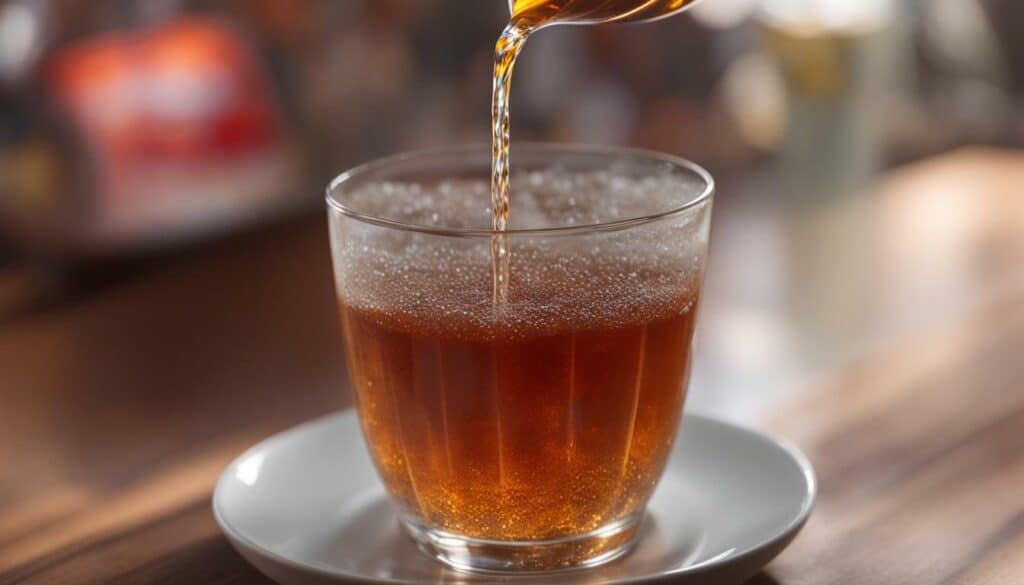Large sweet tea calories have become a cause for concern in America’s quest for better health. As our nation grapples with rising obesity rates and related health issues, it is important to understand the impact of sweet tea on our overall well-being. In this article, we will delve into the topic of large sweet tea calories and why it’s crucial to be aware of their content.
- Understanding the calorie content of large sweet tea is essential for making informed choices about our beverage consumption.
- Sweet tea nutrition facts provide valuable information about the nutritional composition and potential health benefits of sweet tea.
- Excessive sugar consumption in sweet tea can contribute to weight gain and other health issues, highlighting the need to monitor our intake.
- Different brands of sweet tea vary in their sugar and calorie content, making it important to compare options and choose wisely.
- By following dietary guidelines for added sugars and making healthier choices, we can enjoy sweet tea while minimizing the impact on our health.
Throughout this article, we will explore the nutritional composition of sweet tea, unveil the calorie content of large sweet tea, and discuss the impact of sugar on our health. We will also provide helpful information about sweet tea from various fast food chains and offer practical advice for making informed choices. Join me on this journey to discover the truth behind large sweet tea calories and how we can work towards a healthier America.
Understanding Sweet Tea Nutrition Facts
To make informed choices about our beverage consumption, it’s crucial to understand the nutrition facts of sweet tea. Whether you enjoy it as a refreshing treat or a staple of your daily routine, being aware of the nutritional composition of sweet tea can help you make healthier decisions.
Sweet tea is typically made by combining tea leaves with sugar or other sweeteners, resulting in a flavorful and satisfying beverage. However, it’s important to note that sweet tea can vary in terms of its calorie content and nutritional value depending on how it’s prepared and the brand you choose.

When examining the nutrition facts of sweet tea, one key component to consider is the calorie content. While the exact number of calories may differ between brands and serving sizes, sweet tea is generally not a low-calorie beverage. This is due to the added sugars or sweeteners used to enhance the taste. It’s essential to be mindful of the serving size and the impact it can have on your overall daily calorie intake.
In addition to calories, sweet tea may also contain carbohydrates, which contribute to its energy value. The carbohydrates in sweet tea come mainly from the added sugars, which can contribute to the total carbohydrate count. Paying attention to the carbohydrate content can be beneficial, especially for individuals monitoring their carbohydrate intake.
By understanding the nutrition facts of sweet tea, you can make informed choices that suit your dietary goals and preferences. Whether you opt for lower-calorie alternatives, smaller portion sizes, or enjoy sweet tea as an occasional indulgence, being aware of the nutritional information empowers you to make choices that align with your overall health and wellness.
Unveiling the Calorie Content of Large Sweet Tea
When it comes to large sweet tea, the calorie count might surprise you. Many people enjoy this refreshing beverage without realizing just how many calories it contains. Let’s take a closer look at the calorie content of large sweet tea and the impact it can have on our health.
According to research, a large sweet tea can contain anywhere from 200 to 300 calories. This calorie count may vary depending on the brand and the size of the serving. It’s important to note that these calories come primarily from added sugars, which can contribute to weight gain and increased risk of chronic diseases.
A high calorie intake from sweet tea can easily go unnoticed, especially if it becomes a regular part of our diet. Consuming excessive calories from sugary beverages like large sweet tea can lead to weight gain and potentially contribute to the development of conditions such as obesity, diabetes, and heart disease.
As shown in the table above, different brands of sweet tea may vary in their calorie content. It’s important to check the nutritional information and choose lower-calorie options when possible. And remember, moderation is key. Enjoying a large sweet tea as an occasional treat is fine, but it’s essential to be mindful of our overall calorie intake and make healthier choices for a balanced diet.

So, the next time you reach for a large sweet tea, be aware of the calorie content. Consider enjoying it in moderation and opt for lower-calorie alternatives when possible. By making informed choices, we can help promote a healthier America, one sweet tea at a time.
The Impact of Sugar Content in Sweet Tea
The sugar content in sweet tea plays a significant role in its calorie content and overall health effects. While sweet tea is a beloved beverage in America, it’s important to be aware of the potential consequences of consuming excessive amounts of sugar. High sugar intake has been linked to various health issues, including weight gain, tooth decay, and an increased risk of chronic diseases such as diabetes and heart disease.
According to the dietary guidelines for added sugars, individuals should limit their daily sugar intake to no more than 10% of their total calorie intake. For an average adult consuming 2,000 calories per day, this equates to a maximum of 200 calories or 50 grams of added sugars. It’s worth noting that a single serving of sweet tea can contain up to 35 grams of sugar, surpassing the recommended daily limit in just one beverage.
Let’s compare the sugar and calorie content of different brands of sweet tea. The table below provides an overview of the sugar and calorie content per serving for popular brands:
| Brand | Sugar Content (g) | Calories |
|---|---|---|
| Pure Leaf Sweet Tea | 24 | 100 |
| Lipton Sweet Tea | 25 | 90 |
| Snapple Sweet Tea | 36 | 150 |
As you can see, the sugar content can vary significantly among different brands. It’s important to carefully read the nutrition labels and choose brands with lower sugar content to reduce your overall sugar intake. Additionally, being mindful of portion sizes is crucial as larger servings of sweet tea will naturally contain more sugar and calories.
By understanding the impact of sugar content in sweet tea and making informed choices, you can enjoy this delightful beverage while also prioritizing your health and well-being.

Sweet tea can offer some surprising health benefits amidst its calorie count. While it may be tempting to focus solely on the calorie content of this beloved beverage, it’s important to consider the nutritional value it can provide. Let’s take a closer look at some of the health benefits of sweet tea.
Antioxidant-rich
One of the key health benefits of sweet tea lies in its antioxidant properties. The authentic tea leaves used in its preparation are rich in flavonoids, which are powerful antioxidants that can help protect our bodies from oxidative stress and inflammation. These antioxidants have been linked to various health benefits, including improved heart health and a reduced risk of chronic diseases.
“The flavonoids found in sweet tea have been shown to have anti-inflammatory and anti-cancer properties, making it a potentially valuable addition to a healthy diet,” says Dr. Sarah Thompson, a nutrition expert.
Hydration properties
Staying properly hydrated is essential for overall health, and sweet tea can contribute to our daily fluid intake. However, it’s important to note that sweet tea is not a complete substitute for plain water. While it does provide hydration, it also contains added sugars and calories. To maintain optimal hydration, it’s best to pair sweet tea consumption with ample amounts of water throughout the day.
Additionally, it’s worth considering alternatives to sweet tea, such as unsweetened tea or herbal infusions, which can offer similar hydration benefits without the additional calories and sugar content.

| Brand | Calories per Serving | Sugar per Serving |
|---|---|---|
| Pure Leaf Sweet Tea | 90 | 22g |
| Lipton Sweet Tea | 70 | 17g |
| Snapple Peach Tea | 150 | 38g |
Source: Nutritional information provided by the respective brands.
It’s clear that sweet tea can provide a refreshing and flavorful beverage option, but it’s important to consume it in moderation. Being aware of the nutritional information, including the calorie and sugar content, can help individuals make informed choices about their sweet tea consumption and overall health.
Dietary Guidelines for Added Sugars
To maintain a healthy lifestyle, it’s important to understand the dietary guidelines for added sugars, especially when consuming sweet tea. Added sugars can contribute to excess calorie intake, leading to weight gain and an increased risk of chronic diseases such as obesity, diabetes, and heart disease.
The American Heart Association recommends limiting added sugar intake to no more than 25 grams per day for women and 36 grams per day for men. When it comes to sweet tea, it’s essential to be aware of the sugar content, as it can vary significantly depending on the brand and serving size.
As you can see from the table above, different brands of sweet tea can vary significantly in their sugar content and calorie count. It’s important to read the nutrition labels and choose brands with lower sugar content to minimize your added sugar intake.
By being mindful of the dietary guidelines for added sugars and making informed choices, you can enjoy sweet tea as part of a balanced diet without compromising your health.

Not all sweet teas are created equal when it comes to their sugar and calorie content. While some options may seem innocent enough, others can be surprising sources of hidden calories and added sugars. Understanding the variations in nutritional composition can help make informed choices when it comes to choosing the right sweet tea for you.
To illustrate these differences, let’s compare some popular brands and their sugar and calorie content. The table below provides an overview of the average sugar and calorie content per serving size for each brand:
As you can see, the sugar and calorie content can vary significantly between brands. Brand B, for instance, contains the highest amount of sugar and calories per serving, while Brand C offers a lower-calorie option with reduced sugar content. It’s important to note that these values are averages and may vary depending on serving size and ingredients used.
When choosing a sweet tea, it’s essential to read the nutrition label and consider the sugar and calorie content. Opting for brands with lower sugar and calorie content can help reduce your overall sugar intake and support a healthier lifestyle. Additionally, you might consider exploring unsweetened or lightly sweetened alternatives, which provide the authentic tea experience without excessive sugar.
By being aware of the variations in sugar and calorie content among different brands of sweet tea, you can make better choices that align with your health goals. Remember, moderation is key, and always consult the nutrition label for accurate information about the product you choose.
Nutritional Information for Large Sweet Tea from Fast Food Chains
If you’re a fan of large sweet tea from fast food chains, knowing the nutritional information is essential. Understanding the calorie content, sugar levels, and other nutritional details can help you make informed choices for a healthier beverage option.
Let’s take a closer look at some popular fast food chains and their large sweet tea offerings:
As you can see, the calorie and sugar content can vary between different fast food chains. It’s important to note that these numbers are approximate and may vary depending on the specific recipe and preparation methods used by each chain.
When consuming large sweet tea, it’s crucial to be mindful of your overall calorie and sugar intake. Excessive consumption of added sugars can contribute to weight gain and increase the risk of developing health issues such as obesity, diabetes, and heart disease.
While an occasional treat is acceptable, it’s advisable to moderate your intake of large sweet tea and opt for healthier alternatives such as unsweetened tea, herbal tea, or infused water. By making informed choices and being mindful of your beverage selection, you can enjoy a balanced and healthier lifestyle.

Remember, knowledge is power, and understanding the nutritional information for large sweet tea from fast food chains empowers you to make better choices for your well-being. So, the next time you’re craving a sweet tea, take a moment to consider the nutritional content and decide what’s best for your health.
Making Informed Choices for Healthier Sweet Tea Consumption
Enjoying sweet tea can be part of a healthy lifestyle if you make informed choices. It’s essential to understand the nutritional facts and calorie content of large sweet tea to ensure you’re not unknowingly consuming excessive calories or sugar. By considering the following tips, you can enjoy a refreshing glass of sweet tea while maintaining a balanced diet.
1. Check the Nutritional Information
Before ordering or purchasing sweet tea, make sure to check the nutritional information provided. Look for the calorie content, sugar content, and carbohydrate composition. This information will help you gauge the impact on your daily calorie intake and make an informed decision about portion size and frequency of consumption.
2. Opt for Unsweetened or Low-Sugar Options
If you’re watching your calorie intake or have specific dietary requirements, consider opting for unsweetened or low-sugar sweet tea. These options have significantly fewer calories and less added sugar compared to their regular counterparts. You can always add natural sweeteners like stevia or a splash of fruit juice to enhance the flavor without adding excessive calories.
3. Be Mindful of Portion Sizes
When enjoying sweet tea, portion control is key. Instead of opting for a large-sized sweet tea, consider choosing a smaller size or sharing it with a friend. This way, you can still satisfy your craving without consuming an excessive amount of calories. Remember, moderation is key to maintaining a healthy lifestyle.
Table: Comparison of calorie and sugar content in different brands of sweet tea per serving.
Remember, making informed choices about sweet tea consumption is crucial for maintaining a healthier lifestyle. By considering the nutritional facts, opting for low-sugar options, being mindful of portion sizes, and incorporating sweet tea into a balanced diet, you can enjoy this classic beverage guilt-free.

Understanding the calorie content of large sweet tea is crucial for promoting a healthier America. As we have explored throughout this article, sweet tea can be surprisingly high in calories and sugar, making it an important consideration for those looking to maintain a balanced diet and make informed choices about their beverage consumption.
By delving into the nutritional composition of sweet tea, we have uncovered the truth behind its calorie content and the impact it can have on our health. The sugar content in sweet tea is a major concern, as excessive sugar consumption has been linked to various health issues, including obesity, diabetes, and heart disease.
When comparing the sugar and calorie content of different brands of sweet tea, we discover significant variations. It is essential to make educated choices, especially when consuming large sweet tea from fast food chains. By being aware of the nutritional information provided by these establishments, we can make informed decisions that align with our health goals.
To promote a healthier America, it is advisable to consider alternatives to sweet tea or reduce the portion sizes and frequency of consumption. By doing so, we can reduce our calorie intake and ensure we are meeting the dietary guidelines for added sugars. Making informed choices when it comes to sweet tea consumption is a small step toward a healthier lifestyle for ourselves and our communities.
FAQ
Q: What is the calorie content of sweet tea?
A: The calorie content of sweet tea can vary depending on the brand and serving size. On average, an 8-ounce serving of sweet tea can contain approximately 100-150 calories.
Q: How many carbohydrates are in sweet tea?
A: Sweet tea is generally high in carbohydrates due to the added sugars. An 8-ounce serving of sweet tea can contain around 25-30 grams of carbohydrates.
Q: What are the health benefits of sweet tea?
A: Sweet tea, when consumed in moderation, can provide some health benefits. It contains antioxidants and can contribute to hydration. However, excessive consumption may lead to weight gain and other health issues.
Q: What are the dietary guidelines for added sugars?
A: The American Heart Association recommends limiting added sugar intake to no more than 25 grams (6 teaspoons) per day for women and 36 grams (9 teaspoons) per day for men.
Q: How does the sugar and calorie content of different sweet tea brands compare?
A: The sugar and calorie content of sweet tea can vary significantly between brands. Some brands may have lower sugar and calorie content than others. It is important to check the nutritional information to make informed choices.
Q: How many calories are in a large sweet tea from fast food chains?
A: The calorie content of a large sweet tea from fast food chains can range from 200 to 400 calories, depending on the brand and additional flavors or toppings.
Q: How can I make healthier choices when consuming sweet tea?
A: To make healthier choices when consuming sweet tea, you can opt for unsweetened or lightly sweetened varieties, control portion sizes, and consider alternatives like herbal tea or infused water.
Are Korean Fish Cakes a Healthier Snack Option Compared to Large Sweet Tea?
When it comes to snack options, a korean fish cake calorie analysis reveals interesting insights. Korean fish cakes are a flavorful treat that can be enjoyed guilt-free, as they are low in calories and high in protein. In contrast, large sweet tea can be a high-calorie beverage choice, loaded with sugar. Making an informed decision about your snacking habits will benefit your overall health.





Leave a Reply